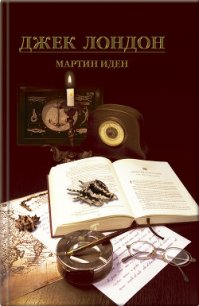Мартин Иден / Martin Eden - Лондон Джек (читаем книги онлайн бесплатно txt) 📗
“Give me time,” he said aloud. “Only give me time.”
Time! Time! Time! was his unending plaint.
Chapter 13
No time to lose. His money meant time. He must write. He must earn money. But the newspapers and magazines refuse to publish his stories. Piles of manuscripts were travelling the endless round of the magazines. How did the others do it? He spent long hours in the library, reading what others had written, studying their work eagerly and critically, comparing it with his own, and wondering, wondering, about the secret trick they had discovered which enabled them to sell their work.
No light, no life, no color, was in other writers’ stories. There was no breath of life in their work, and yet it sold, [73] at two cents a word, twenty dollars a thousand. How did they do it?!
His chief trouble was that he did not know any editors or writers. He did not know anybody who had ever attempted to write. There was nobody to tell him, to hint to him, to give him the least word of advice. He began to doubt that editors were real men. They seemed cogs in a machine.
“How well you talk,” one day Ruth said to him, and he noted that she was looking at him strangely.
He was all confusion and embarrassment, the blood flushing red on his neck and brow.
“I want to learn to talk,” he answered. “There is so much in me I want to say. I can’t find ways to say what is really in me. But how can I? My tongue is tied. I try, but I do not succeed. My speech is very awkward. Oh! – ” he threw up his hands with a despairing gesture – “it is impossible! It is incommunicable!”
“But you do talk well,” Ruth noticed. “Just think how you have improved in the short time I have known you. You can go far – if you want to. You have power. You can lead men, I am sure. You can become a good lawyer. You can shine in politics.”
He read to her a story, one that was among his very best. He called it “The Wine of Life”. There was a certain magic in the original conception, and he had adorned it with more magic of phrase and touch. He was blind and deaf to the faults of it. But it was not so with Ruth. Her trained ear detected the weaknesses and exaggerations. She was disagreeably impressed with its amateurishness. [74] That was her final judgment on the story as a whole – amateurish, though she did not tell him so. Instead, when he had done, she pointed out the minor flaws and said that she liked the story.
“You have strength,” she said, “but it is untutored strength.”
“Like a bull in a china shop,” he suggested, and won a smile.
“It is beautiful. It is beautiful,” she repeated, with emphasis, after a pause.
Of course it was beautiful; but there was something more than mere beauty in it. He had failed. He was inarticulate. He had seen one of the greatest things in the world, and he had not expressed it.
“It is too wordy. But it was beautiful, in places. You want to be famous?” she asked abruptly.
“Yes, a little bit,” he confessed. “That is part of the adventure. And after all, to be famous would be, for me, only a means to something else. I want to be famous very much, for that matter, and for that reason.”
“For your sake, [75]” he wanted to add.
“I wish you would show me all you write, Mr. Eden,” she said.
He flushed with pleasure. She was interested, that was sure. And at least she had not given him a rejection slip.
“I will,” he said passionately. “And I promise you, Miss Morse, that I will become a writer.” He held up a bunch of manuscript. “Here are the ‘Sea Lyrics. [76]’ Please tell me just what you think of them. What I need, you know, above all things, is criticism. And do, please, be frank with me.”
“I will be perfectly frank,” she promised.
Chapter 14
“The first battle, fought and finished,” Martin said to the looking-glass ten days later. “But there will be a second battle, and a third battle, and battles to the end of time, unless – ”
He had not finished the sentence, but looked about his little room, and his eyes saw a heap of returned manuscripts, still in their long envelopes, which lay in a corner on the floor.
He sat down and regarded the table thoughtfully. There were ink stains upon it, and he suddenly discovered that he loved it very much.
“Dear old table,” he said, “I’ve spent some happy hours with you, and you are a good friend of mine.”
He dropped his arms upon the table and buried his face in them. His throat was aching, and he wanted to cry.
His knees were trembling under him, he felt faint, and he went to the bed. He looked about the room, perplexed, alarmed, wondering where he was, until he caught sight of the pile of manuscripts in the corner. He arose to his feet and confronted himself in the looking-glass.
Конец ознакомительного фрагмента.
Текст предоставлен ООО «ЛитРес».
Прочитайте эту книгу целиком, купив полную легальную версию на ЛитРес.
Безопасно оплатить книгу можно банковской картой Visa, MasterCard, Maestro, со счета мобильного телефона, с платежного терминала, в салоне МТС или Связной, через PayPal, WebMoney, Яндекс.Деньги, QIWI Кошелек, бонусными картами или другим удобным Вам способом.
His chief trouble was that he did not know any editors or writers. He did not know anybody who had ever attempted to write. There was nobody to tell him, to hint to him, to give him the least word of advice. He began to doubt that editors were real men. They seemed cogs in a machine.
“How well you talk,” one day Ruth said to him, and he noted that she was looking at him strangely.
He was all confusion and embarrassment, the blood flushing red on his neck and brow.
“I want to learn to talk,” he answered. “There is so much in me I want to say. I can’t find ways to say what is really in me. But how can I? My tongue is tied. I try, but I do not succeed. My speech is very awkward. Oh! – ” he threw up his hands with a despairing gesture – “it is impossible! It is incommunicable!”
“But you do talk well,” Ruth noticed. “Just think how you have improved in the short time I have known you. You can go far – if you want to. You have power. You can lead men, I am sure. You can become a good lawyer. You can shine in politics.”
He read to her a story, one that was among his very best. He called it “The Wine of Life”. There was a certain magic in the original conception, and he had adorned it with more magic of phrase and touch. He was blind and deaf to the faults of it. But it was not so with Ruth. Her trained ear detected the weaknesses and exaggerations. She was disagreeably impressed with its amateurishness.[74] That was her final judgment on the story as a whole – amateurish, though she did not tell him so. Instead, when he had done, she pointed out the minor flaws and said that she liked the story.
“You have strength,” she said, “but it is untutored strength.”
“Like a bull in a china shop,” he suggested, and won a smile.
“It is beautiful. It is beautiful,” she repeated, with emphasis, after a pause.
Of course it was beautiful; but there was something more than mere beauty in it. He had failed. He was inarticulate. He had seen one of the greatest things in the world, and he had not expressed it.
“It is too wordy. But it was beautiful, in places. You want to be famous?” she asked abruptly.
“Yes, a little bit,” he confessed. “That is part of the adventure. And after all, to be famous would be, for me, only a means to something else. I want to be famous very much, for that matter, and for that reason.”
“For your sake,[75]” he wanted to add.
“I wish you would show me all you write, Mr. Eden,” she said.
He flushed with pleasure. She was interested, that was sure. And at least she had not given him a rejection slip.
“I will,” he said passionately. “And I promise you, Miss Morse, that I will become a writer.” He held up a bunch of manuscript. “Here are the ‘Sea Lyrics.[76]’ Please tell me just what you think of them. What I need, you know, above all things, is criticism. And do, please, be frank with me.”
“I will be perfectly frank,” she promised.
Chapter 14
“The first battle, fought and finished,” Martin said to the looking-glass ten days later. “But there will be a second battle, and a third battle, and battles to the end of time, unless – ”
He had not finished the sentence, but looked about his little room, and his eyes saw a heap of returned manuscripts, still in their long envelopes, which lay in a corner on the floor.
He sat down and regarded the table thoughtfully. There were ink stains upon it, and he suddenly discovered that he loved it very much.
“Dear old table,” he said, “I’ve spent some happy hours with you, and you are a good friend of mine.”
He dropped his arms upon the table and buried his face in them. His throat was aching, and he wanted to cry.
His knees were trembling under him, he felt faint, and he went to the bed. He looked about the room, perplexed, alarmed, wondering where he was, until he caught sight of the pile of manuscripts in the corner. He arose to his feet and confronted himself in the looking-glass.
Конец ознакомительного фрагмента.
Текст предоставлен ООО «ЛитРес».
Прочитайте эту книгу целиком, Купить полную версию книги



